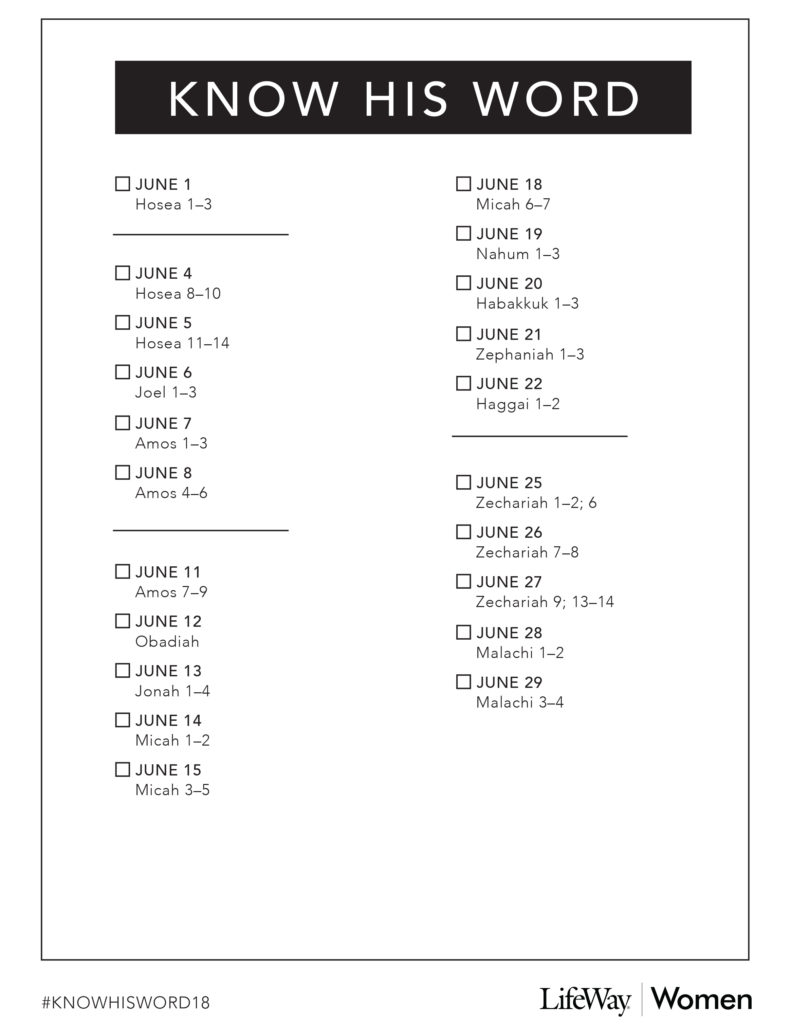
As we strive to Know His Word more deeply in 2018, we’ll be reading the Bible together in genres. Our hope is that together we will see how each book of the Bible fits into the overarching story of Scripture. On the first day of each month, we’ll walk through a new biblical genre together. This month, we’ll be looking at the books of the Minor Prophets.
To rephrase the old theater adage, there are no minor prophets, only shorter books. The minor prophets are not in any way minor. In fact, you may be more familiar with some of their stories than you are with those in the major leagues. These guys also spoke the words of God to His people. The minor/major distinction merely comes from the length of the books in the Bible.
The books of minor prophets include: Hosea, Joel, Amos, Obadiah, Jonah, Micah, Nahum, Habakkuk, Zephaniah, Haggai, Zechariah, Malachi. It’s a long list, but some of them are very short books—anyone remember trying to find Obadiah in a Bible drill?
Some of those names may sound familiar. Most of us, even if we didn’t grow up in church, have heard stories of Jonah and the big fish. Those in our latest online Bible study are now intimately familiar with the life and story of Hosea. You may have seen Micah 6:8 tattooed on a bicep before. Others on the list are lesser known. You don’t really hear of a lot of baby Habakkuks these days.
We read the minor prophets with the same lens through which we read the major prophets. These men spoke the truth about God during hostile times in their world. They demonstrated God’s faithfulness to keep His promises throughout the turmoil and chaos of sin and destruction in the world. They spoke of hope and redemption in a time when the world seemed dark and meaningless. We read the minor prophets to see God’s love of His people, no matter what. We read the minor prophets to learn to place our hope in the One who came and is coming again to fulfill all of God’s promises to His people.
Again, we love how the CSB Study Bible puts each book in light of the rest of Scripture:
Hosea compared the relationship between God and His people to that of a husband and His wife, drawing a parallel between spiritual and marital unfaithfulness. Yet nothing can quench God’s love for His covenant people. Hosea points ahead to God’s love perfectly expressed in Christ, who bought the freedom of His bride, the church, with His own life.
The Book of Joel shows us the Creator and Redeemed God of all the universe in complete control of nature. Joel makes clear that the God of judgment is also a God of mercy who stands ready to redeem and restore when His people come before Him in repentance.
Amos reminds us of the sovereignty of God in His involvement with His people. Amos’s emphasis on the day of the Lord had implications for Amos’s contemporaries, but it also reminds the modern reader of a coming day referred to repeatedly in the New Testament—the day of Christ’s return.
The Book of Obadiah sustains faith in God’s moral government and hope in the eventual triumph of His just will. It brings a pastoral message to aching hearts—God is on His throne and He cares for His people.
The Book of Jonah shows God’s gracious concern for the whole world, His power over nature, and the futility of running from Him. It also foreshadow’s Jesus’ burial and resurrection.
Micah‘s holy and just God demands holiness and justice from all people. Micah preached that true religion comes from a heart tuned to God, resulting in godly living. Thus religion and ethics are inseparable.
The Book of Nahum provides a great view of a powerful, just God who maintains His absolute moral standards and offers hope to those who are despised and downtrodden. Nahum teaches us to trust God. Even when we despair of any help, we can know that God will stand with those who belong to Him.
The Book of Habakkuk looks at an issue that often confronts people: trying to discern God’s purposes in the midst of this world. There is a realization of the will of God for this world. Habakkuk’s message that the righteous will live by faith prepared the way for the greater understanding of this truth in the New Testament.
The promise of a remnant illustrates God’s amazing grace, counterbalancing His jealous wrath and blazing fury against the wicked. Zephaniah invited everyone who humbly obeyed the Lord to seek Him for possible deliverance.
Haggai‘s challenge was to call the community of Jews living in Jerusalem after the exile not simply to focus on their own creature comforts but to honor God. This commitment would be reflected in their work on the temple. Haggai’s call for the people to get their priorities in order and place God first by rebuilding His temple was of great importance. To return to this task was a sign of their priorities. The restoration of the temple was a sign that God had not revoked His covenants with Levi or David.
The Book of Zechariah is full of the language of judgment, but it is also full of God’s promises. Zechariah’s prophecies anticipate the grand culmination of history, describing a coming glorious king, a God who triumphs over all, and a world with all wrongs corrected.
Malachi was the last prophetic message from God before the close of the Old Testament period. Malachi spoke to the hearts of a troubled people whose circumstances of financial insecurity, religious skepticism, and personal disappointments were similar to those often experienced by God’s people today. We have a great, loving, and holy God, who has unchanging and glorious purposes for His people.
Here is a reading plan with selected passages from the books of the Minor Prophets to read this month. We aren’t reading every verse in these books, but we hope the passages we’ve selected will help us all see the bigger story of Scripture as we strive to know His Word even more. We can’t wait to read and learn alongside you. Here’s a PDF of the June reading plan to print!
We would love to hear what you’re learning as we read through His Word together. Share on social media with the hashtag #KnowHisWord18, so we can learn together! We’ve also included an image below, featuring a verse we’ll read this month, perfect for Instagram.



